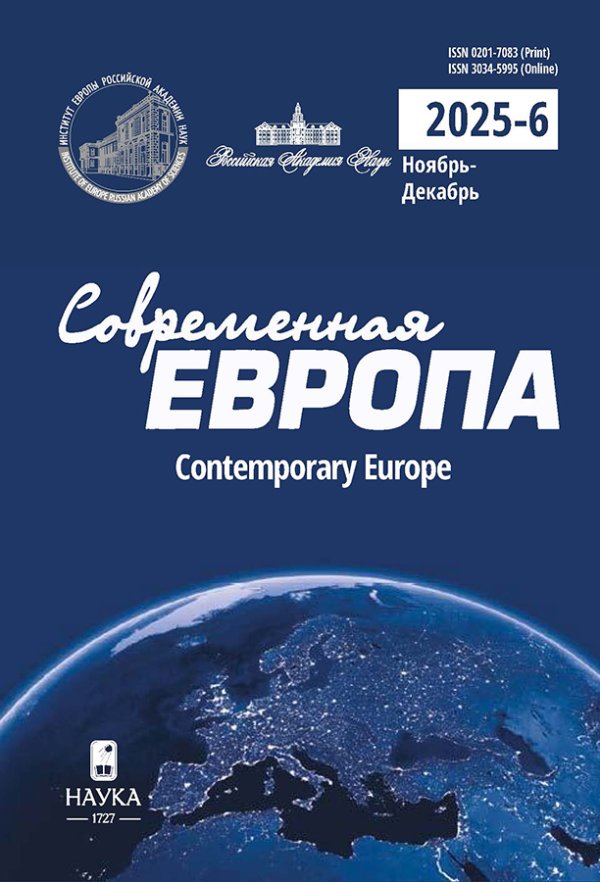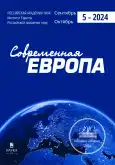The EU Strategic Approach to China (2016‒2023)
- Authors: Leushkin D.V1, Samoilov N.G2
-
Affiliations:
- Institute of International Relations and World History, National Research Lobachevsky State University of Nizhny Novgorod
- Saint Petersburg State University
- Issue: No 5 (126) (2024)
- Pages: 49-59
- Section: EUROPEAN PROCESS: COUNTRIES AND REGIONS
- URL: https://journal-vniispk.ru/0201-7083/article/view/271016
- DOI: https://doi.org/10.31857/S0201708324050048
- ID: 271016
Cite item
Full Text
Abstract
Keywords
About the authors
D. V Leushkin
Institute of International Relations and World History, National Research Lobachevsky State University of Nizhny Novgorod
Email: den.leushkin@mail.ru
Candidate of Science (Politics), Associate Professor Nizhny Novgorod, Russia
N. G Samoilov
Saint Petersburg State University
Email: samoilovng@gmail.com
School of International Relations Saint Petersburg, Russia
References
- Белов В.Б. (2023) Германо-китайские экономические отношения в условиях актуальных геополи-тических вызовов. Современная Европа. № 7. С. 111‒126.
- Belov V.B. (2023) Germano-kitaiskie ekonomicheskie otnosheniya v usloviyakh aktual'nykh geo-politicheskikh vyzovov [German-Chinese Economic Relations in the Context of Current Geopolitical Challenges], Sovremennaya Evropa, 7, pp. 111‒126. (In Russian).
- Буторина О.В., Алексеенкова Е.С. (ред.) (2022) Фактор Китая в Средиземноморье. ИЕ РАН, Москва. 200 с.
- Butorina O.V., Alekseenkova E.S. (ed.) (2022) Faktor Kitaya v Sredizemnomor'e [The China Factor in the Mediterranean], IE RAS, Moscow, Russia. (In Russian).
- Буторина О.В. (2023) Торговля Евросоюза с Китаем: проблема дефицита. Современная Европа. № 7. С. 5‒20.
- Butorina O.V. (2023) Torgovlya Evrosoyuza s Kitaem: problema defitsita [EU Trade with China: the Problem of Scarcity], Sovremennaya Evropa, 7, pp. 5‒20. (In Russian).
- Данилин И.В., Квашнин Ю.Д., Кислицын С.В., Кобринская И.Я., Ломанов А.В., Уткин С.В. (2022) Евросоюз-Китай в меняющемся мироустройстве. Мировая экономика и международные отношения. № 1. C. 68‒79.
- Danilin I.V., Kvashnin Y.D., Kislitsyn S.V., Kobrinskaya I.Ya., Lomanov A.V., Utkin S.V. (2022) Evrosoyuz-Kitai v menyayushchemsya miroustroistve [European Union – China in the Changing World Composition], World Economy and International Relations, 1, pp. 68‒79. (In Russian).
- Носов М.Г. (2018) ЕС и Китай: торговля и стратегия. Современная Европа. № 6. С. 5‒17.
- Nosov M.G. (2018) ES i Kitai: torgovlya i strategiya [EU and China: Trade or Strategy], Sovremennaya Evropa, 6, pp. 5‒17. (In Russian).
- Носов М.Г. (2015) ЕС – Китай. Европейский союз в поиске глобальной роли: политика, экономика, безопасность. Под общ. ред. Ал.А. Громыко, М.Г. Носова. ИЕ РАН; Весь Мир, Москва. С. 269‒287.
- Nosov M.G. (2015) ES – Kitai, in Al.A. Gromyko, M.G. Nosov (ed.) Evropeiskii soyuz v poiske glob-al'noi roli: politika, ehkonomika, bezopasnost' [The European Union in Search of Global Role: Politics, Economy, Security], IE RAN; Ves' Mir, Moscow, Russia, pp. 269‒287. (In Russian).
- Alves D.R. (2023) The EU’s discourse coherence and its relationship with China: a new normative actor? SN Social Sciences. Vol. 4. P. 1‒21.
- Andersson J.J., Cramer C.S. (2023) Yearbook of European Security. EUISS, Paris, France. 115 p.
- Crosson D.M., Benaglia S., Vermeulen L. (2023) Future-proofing EU Security and Defence Cooperation in the Indo-Pacific: Doubling down with Friends. CEPS, Brussels, Belgium. 9 p.
- Ekman A. (2023) China’s Global Security Initiative. Brief 5. EUISS, Paris, France. 4 p.
- Ekman A. (2022) China and the Battle of Coalitions. The “Circle of Friends” Versus the Indo-Pacific Strategy. Chaillot Paper 174. EUISS, Paris, France. 59 p.
- Ekman A. (2020) What if… We Avoided Wordplay with China? What if… Chaillot Paper 157. Ed. by F. Gaub. EUISS, Paris, France. P. 8‒13.
- Fiott D., Lindstrom G. (2021) Strategic Compass: New bearings for EU Security and Defence? Chaillot Paper 171. EUISS, Paris, France. 62 p.
- Fiott D. (2021) Naval Gazing? The Strategic Compass and the EU’s Maritime Presence. Brief 16. EUISS, Paris, France. 8 p.
- Sanchez Cacicedo A. (2023) India’s G20 Presidency: A Showcase for Skilful Minilateralism. Brief 17. EUISS, Paris, France. 8 p.
Supplementary files










